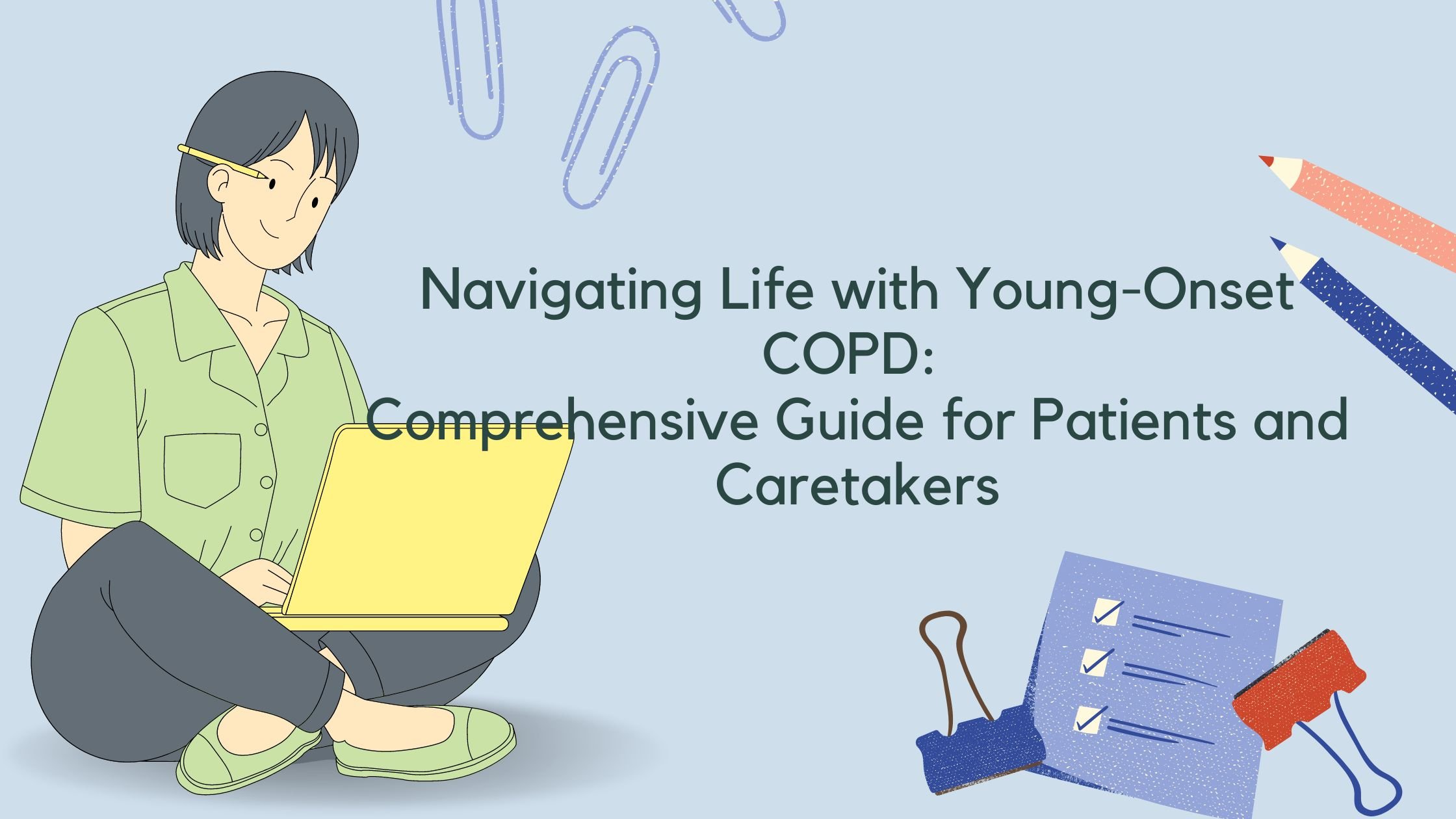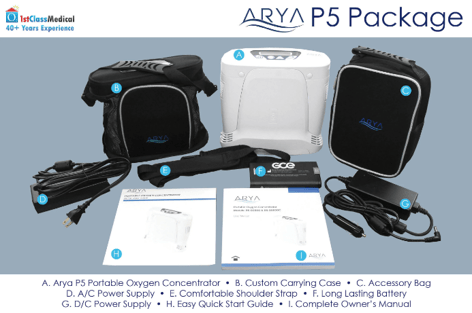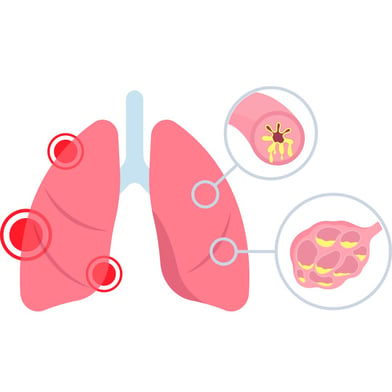
COPD isn't just a diagnosis reserved for the elderly; an increasing number of young individuals are confronting this challenging condition and navigating it throughout their lives. It's a topic that demands more attention, discussion, and understanding as young-onset COPD reshapes the lives of those affected by it.
Surprisingly, a significant number of young individuals in the USA are grappling with COPD, challenging the misconception that it exclusively affects older adults.
Being diagnosed with Chronic Obstructive Pulmonary Disease (COPD) at a young age can be a daunting journey filled with unique challenges. This comprehensive guide aims to provide young individuals with COPD and their caretakers an in-depth analysis of the condition, its causes, management strategies, and the physical and emotional aspects to consider over the course of their lives.
Understanding Young-Onset COPD

Young-onset COPD refers to the diagnosis of COPD in individuals under the age of 40. While relatively rare, this condition presents distinct challenges due to its unexpected appearance during the prime of life.
COPD's characteristic symptoms—such as shortness of breath, coughing, and wheezing—can significantly impact daily activities, education, career prospects, and relationships.
Causes of Young-Onset COPD

Young-onset COPD refers to the diagnosis of Chronic Obstructive Pulmonary Disease (COPD) in individuals under the age of 40. While smoking is a major risk factor for COPD, there are other causes and factors that can contribute to the development of COPD at a young age. Here are the key causes and factors associated with young-onset COPD:
-
Genetic Factors: Some individuals might have genetic predispositions that make them more susceptible to developing COPD, even without exposure to common risk factors like smoking. Alpha-1 antitrypsin deficiency is a genetic condition that can lead to early-onset COPD. This deficiency reduces the ability of the lungs to protect themselves from inflammation caused by smoke, leading to lung damage.
-
Environmental Exposures: Exposure to various pollutants and irritants in the environment can contribute to the development of COPD. Occupational hazards such as dust, fumes, chemicals, and pollutants in certain work environments can increase the risk of COPD, especially if proper protective measures aren't taken.
-
Secondhand Smoke: Being exposed to secondhand smoke from tobacco products, especially during childhood and adolescence, can increase the risk of developing COPD at a younger age.
-
Early-Life Respiratory Infections: Severe respiratory infections, particularly during childhood, can damage the lungs and increase the vulnerability to COPD later in life.
-
Asthma: Untreated or poorly managed asthma, especially if it involves chronic inflammation and airway remodeling, can lead to irreversible lung damage over time, contributing to the development of COPD.
-
Recurrent Lung Infections: Repeated episodes of respiratory infections, such as pneumonia and bronchitis, can cause damage to the airways and lung tissue, increasing the risk of COPD.
-
Alpha-1 Antitrypsin Deficiency: As mentioned earlier, this genetic condition affects the production of a protein that helps protect the lungs from inflammation caused by smoke and pollutants. Individuals with this deficiency are more susceptible to developing COPD, even without extensive smoking.
-
Autoimmune Conditions: Some autoimmune diseases, like rheumatoid arthritis, can lead to chronic inflammation in the body, including the lungs, which can contribute to the development of COPD.
It's important to note that the causes of young-onset COPD can be multifactorial, often involving a combination of genetic predisposition, environmental exposures, and lifestyle factors.
While smoking remains a major risk factor for COPD, especially in young individuals, other factors should also be considered, and those diagnosed with young-onset COPD should work closely with healthcare professionals to manage their condition effectively.
Life-Long Management Strategies
- Medical Care: Establish a strong relationship with a healthcare provider experienced in managing COPD. Regular check-ups, lung function tests, and medication adjustments are essential.
- Lifestyle Modifications: Quit smoking if applicable, and avoid exposure to smoke and environmental pollutants. Maintain a well-balanced diet, exercise regularly, and get vaccinated against respiratory infections.
- Medications: Depending on disease severity, medication options include bronchodilators, inhaled corticosteroids, and oxygen therapy.
- Pulmonary Rehabilitation: These structured programs combine exercise, education, and support to improve lung function, endurance, and quality of life.
- Breathing Techniques: Techniques like pursed-lip breathing and diaphragmatic breathing can help manage breathlessness.
- Emotional Support: Living with a chronic condition can take an emotional toll. Seek therapy or support groups to address anxiety, depression, and the stress of managing COPD.
These lifestyle modifications are imperative for those living with or living close to a young person with COPD. So we wanted to lay out in more detail what these modifications mean and how one might go about managing their lifestyle choices in the following section.
Life-Long Management Strategies Explained

1. Medical Care
Establishing a strong partnership with a healthcare provider experienced in COPD management is paramount for young individuals diagnosed with the condition.
Regular check-ups will allow your healthcare team to monitor disease progression, assess your lung function, and make necessary adjustments to your treatment plan. Lung function tests, such as spirometry, are crucial in tracking changes over time and helping doctors determine the most effective interventions. These tests measure how much air you can inhale and exhale, providing valuable insights into the severity of your condition.
Maintaining open communication with your healthcare provider is essential. Share any changes in symptoms, lifestyle, or medication reactions to ensure your treatment plan remains up to date and aligned with your needs. Moreover, consider working with a multidisciplinary team that may include pulmonologists, respiratory therapists, and nutritionists to address different aspects of your health.
2. Lifestyle Modifications

For young individuals with COPD, lifestyle modifications play a pivotal role in managing the condition and enhancing overall well-being.
Smoking Cessation: If you're a smoker, quitting is crucial. Seek support from healthcare professionals, support groups, or smoking cessation programs. Even if you haven't smoked, avoiding secondhand smoke and other environmental pollutants is essential.
Diet and Exercise: A balanced diet rich in fruits, vegetables, whole grains, and lean protein can support your immune system and energy levels. Regular exercise, tailored to your capacity, can improve lung function and cardiovascular health. Consult your healthcare provider before starting any exercise regimen.
Respiratory Infections: As respiratory infections can exacerbate COPD symptoms, it's crucial to prioritize preventive measures. Getting vaccinated against infections like the flu and pneumonia can significantly reduce your risk.
3. Medications

Medication management is a cornerstone of COPD treatment, and the type of medication prescribed depends on the severity of your condition. Bronchodilators, which come in short-acting and long-acting forms, help relax the muscles around your airways, making it easier to breathe.
Inhaled corticosteroids can help reduce inflammation in the airways. Oxygen therapy might be recommended if your blood oxygen levels are low. It's essential to use these medications as prescribed and discuss any side effects or concerns with your healthcare provider.
4. Pulmonary Rehabilitation
Participating in pulmonary rehabilitation programs offers an opportunity to improve your lung function, endurance, and quality of life. These structured programs typically involve supervised exercise routines that gradually increase in intensity, focusing on strengthening your respiratory muscles.
Additionally, you'll receive education on proper breathing techniques, energy conservation strategies, and emotional support. Pulmonary rehabilitation equips you with practical tools to manage daily activities more effectively and build physical resilience.
5. Breathing Techniques and Oxygen Therapy

Managing breathlessness is a crucial aspect of living with COPD. In addition to practicing breathing techniques like pursed-lip and diaphragmatic breathing, you might also need to explore supplemental oxygen therapy, especially as the disease progresses.
Breathing Techniques: As mentioned earlier, techniques like pursed-lip and diaphragmatic breathing are powerful tools to help manage breathlessness. These techniques enhance the efficiency of your breathing, reduce the sensation of shortness of breath, and provide you with a sense of control over your breathing patterns. Incorporating these techniques into your daily routine can make a significant difference in your quality of life and overall well-being.
Supplemental Oxygen Therapy: As COPD advances, you might experience a decrease in blood oxygen levels. This is where supplemental oxygen therapy comes into play. Oxygen therapy involves the use of devices, such as portable oxygen concentrators (POCs), to deliver additional oxygen to your lungs. It's important to note that oxygen therapy is typically prescribed by your healthcare provider based on specific criteria and tests.
LPT Medical's POC Options

LPT Medical offers a range of portable oxygen concentrators (POCs) designed to provide flexibility and independence to individuals with COPD. These devices are compact, lightweight, and designed for on-the-go use.
With LPT Medical's POC options, you can continue to engage in various activities while receiving the necessary oxygen support. Whether you're exploring the outdoors, spending time with loved ones, or pursuing your passions, portable oxygen concentrators can make a significant difference in your daily life.
When Supplemental Oxygen May Be Needed: As COPD progresses, your lung function may decline, leading to decreased oxygen saturation in your blood. This can result in symptoms such as fatigue, confusion, and shortness of breath even at rest. Your healthcare provider will conduct tests to determine if and when supplemental oxygen is necessary.
Oxygen therapy aims to improve your blood oxygen levels, alleviate symptoms, and enhance your overall well-being. It's important to work closely with your healthcare team to determine the right oxygen flow rate and usage schedule tailored to your needs.
6. Emotional Support
Living with COPD, especially at a young age, can take a toll on your emotional well-being. Coping with symptoms, lifestyle adjustments, and potential limitations can lead to anxiety, depression, and stress.
Seeking emotional support is just as crucial as physical care. Consider joining support groups where you can connect with others facing similar challenges. Individual therapy or counseling can also provide a safe space to address your emotional needs and develop coping strategies. Remember that addressing your mental health is an integral part of holistic COPD management.
Effectively managing COPD at a young age involves a multifaceted approach that encompasses medical care, lifestyle modifications, proper medication usage, rehabilitation, breathing techniques, and emotional support.
By proactively engaging in your care and collaborating closely with your healthcare team, you can lead a fulfilling life while effectively managing your condition. Remember, with the right strategies and support network in place, you can navigate the challenges of COPD and pursue a life rich in opportunities and experiences.
Career and Education Considerations: Nurturing Ambitions Amidst Challenges
Young individuals embarking on their education and career journeys with a diagnosis of COPD often find themselves navigating a unique path. The dreams and aspirations that once felt limitless can now encounter unforeseen hurdles due to the presence of COPD symptoms. While these challenges can indeed be daunting, it's crucial to approach them with empathy, resilience, and a commitment to carving out a fulfilling future.
Choosing a Career Path
Selecting a career path that aligns with your physical limitations while providing flexibility is a thoughtful approach to overcome the challenges posed by COPD. While certain physically demanding professions might seem out of reach, remember that there are a myriad of careers that embrace your strengths and talents.

Pursuing a career that allows for adaptable work environments and reasonable accommodations can help you thrive without compromising your health.
Navigating Education
As you embark on your educational journey, the goal is to find a harmonious balance between your studies and COPD management. Consider exploring online or part-time education options that grant you the flexibility needed to manage your health effectively. These alternatives enable you to pace yourself, ensuring that your educational pursuits don't inadvertently take a toll on your well-being.
Disclosing COPD
The decision of whether to disclose your COPD diagnosis to employers or educational institutions can be a complex one. While it's not an easy choice, remember that your well-being matters.
Disclosing your condition can open doors to necessary accommodations that level the playing field, ensuring that you have the resources and support you need to excel. Employers and educational institutions are increasingly aware of the importance of inclusivity and accessibility, and many are willing to provide necessary adjustments that enable you to perform at your best.
The Power of Empathy

As you navigate the landscape of education and work, it's important to surround yourself with individuals who understand your challenges and offer unwavering support. Seek mentors, friends, and colleagues who exhibit empathy and offer a listening ear. Connecting with individuals who genuinely comprehend the intricacies of managing COPD can serve as a valuable source of encouragement and motivation.
Embracing Your Journey

While COPD may introduce obstacles to your educational and career pursuits, it does not diminish your capacity to achieve greatness. Embrace your journey with self-compassion and an unwavering belief in your potential. Celebrate each milestone, no matter how small, and recognize that your resilience in the face of adversity is a testament to your strength.
Navigating the terrain of education and career with COPD requires both a pragmatic approach and an unwavering spirit. By carefully choosing a career path, exploring adaptable education options, and considering disclosure, you are actively shaping a future that accommodates your health needs while nurturing your ambitions.
Remember, your journey is a testament to your courage, and each step you take is a testament to your determination to thrive despite challenges. Approach your aspirations with empathy, embrace your uniqueness, and you'll find that the possibilities ahead are vast and full of promise.
Building Meaningful Relationships: Forging Connections Despite Challenges

Navigating relationships, whether romantic, familial, or social, is a vital aspect of a fulfilling life. For young individuals with COPD, building and nurturing connections can present unique challenges, but these challenges can be met with creativity, patience, and open communication.
1. Communicate Openly
When entering new relationships, whether romantic or otherwise, open communication is key. Be transparent about your COPD diagnosis, explaining what it entails and how it might impact your activities. This not only fosters understanding but also paves the way for your loved ones to support you in managing your condition effectively.
2. Choose Supportive Partnerships
In romantic relationships, seek partners who are empathetic, patient, and understanding of your COPD journey. A supportive partner will respect your needs, offering encouragement and adapting activities to accommodate your health requirements. A strong partnership can be a pillar of emotional support as you face challenges together.
3. Socialize Strategically
While managing COPD may necessitate some lifestyle adjustments, it shouldn't curtail your social life. Opt for social activities that align with your energy levels and health needs. Engage in activities that allow you to connect with others while taking breaks as needed. This might involve planning outings during times when your symptoms are milder or selecting less physically demanding activities.
4. Join Support Groups
Consider joining support groups for individuals with COPD or chronic conditions. These groups offer a safe space to connect with others who share similar experiences, providing a sense of camaraderie and understanding. Not only can you learn coping strategies, but you'll also form meaningful relationships with individuals who truly comprehend the challenges you face.
5. Embrace Online Communities
The digital age offers a plethora of opportunities to connect with people worldwide. Engage in online forums, social media groups, or platforms dedicated to COPD awareness. Engaging with individuals who understand your struggles can provide solace and a platform to share your journey.
6. Prioritize Self-Care
Relationships thrive when individuals prioritize their own well-being. Taking care of your physical and emotional health allows you to be present and engaged in your relationships. Engage in activities that bring you joy, practice stress-reduction techniques, and ensure you're adhering to your COPD management plan.
7. Educate Loved Ones
Educating your friends, family, and potential partners about COPD can demystify the condition and foster empathy. Share resources, provide insights into your daily life, and clarify how they can offer support. Those who care about you will appreciate your openness and take steps to accommodate your needs.
8. Patience and Self-Compassion
Remember that building relationships takes time, and it's okay to proceed at a pace that feels comfortable to you. Be patient with yourself and your loved ones, and practice self-compassion. Your worth isn't defined by your condition; it's defined by the connections you create and the love you share.
Building relationships as a young individual with COPD requires a combination of honesty, empathy, and adaptability. While challenges may arise, remember that meaningful connections are possible when you communicate your needs, surround yourself with understanding individuals, and engage in activities that enrich your life.
By nurturing your relationships with patience, openness, and self-care, you can foster bonds that provide emotional support, happiness, and a sense of belonging on your unique journey.
Supporting Loved Ones with COPD: A Caregiver's Guide to Empowerment and Education
.jpg?width=378&height=378&name=young%20person%20with%20COPD%209%20(1).jpg)
Caring for a young individual with a COPD diagnosis can feel both rewarding and challenging. As a caregiver, your role in providing physical and emotional support is invaluable in helping your loved one manage their condition effectively. By equipping yourself with knowledge and understanding, you can instill confidence in your caregiving journey while creating a nurturing environment for your loved one's well-being.
1. Educate Yourself
Empowerment begins with education. Take the time to learn about COPD: its causes, symptoms, treatments, and management strategies. Familiarize yourself with your loved one's specific medical needs and treatment plan. Understanding the condition equips you to provide informed care, anticipate challenges, and advocate effectively on their behalf.
2. Collaborate with Healthcare Professionals
Your loved one's healthcare team is your ally. Engage in open communication with their doctors, nurses, and therapists. Seek guidance on medication management, exercise routines, dietary considerations, and any necessary medical equipment. This collaborative approach ensures that your caregiving efforts align with their medical recommendations.
3. Encourage Adherence
Assist your loved one in adhering to their treatment plan. This includes medication schedules, doctor's appointments, and recommended lifestyle modifications. By offering gentle reminders and providing organization support, you play a vital role in helping them maintain their health regimen.
4. Create a Healthy Living Environment
Your home's environment can significantly impact your loved one's well-being. Ensure good indoor air quality by minimizing allergens and irritants. Opt for cleaning products that are low in chemicals and fragrances. Maintain a clutter-free space that reduces tripping hazards and ensures accessibility.
5. Support Lifestyle Adjustments
Help your loved one adapt to lifestyle changes that might arise due to their COPD diagnosis. Encourage regular exercise that aligns with their capabilities and assists them in practicing breathing techniques. Assist in preparing nutritious meals that cater to their dietary needs and energy levels.
6. Emotional Support
COPD not only affects physical health but also emotional well-being. Listen attentively to your loved one's concerns and frustrations. Offer a non-judgmental space where they can express their feelings. Encourage participation in support groups, therapy, or other mental health resources that can provide additional emotional support.
7. Understand Oxygen Therapy
If your loved one requires oxygen therapy, take the time to understand how it works. Familiarize yourself with the portable oxygen concentrator (POC) they use and learn about its features. This knowledge ensures that you can assist them in using the device correctly and troubleshoot any issues that might arise.
8. Encourage Independence
While caregiving is essential, fostering your loved one's independence is equally vital. Encourage them to actively participate in their care decisions and daily routines. Offer assistance when needed, but also empower them to take ownership of their health journey.
9. Be Patient and Compassionate
Caring for someone with COPD involves patience and compassion. Recognize that your loved one might have good and bad days. Offer your unwavering support and celebrate their successes, no matter how small.
As a caregiver, your role is pivotal in helping your loved one navigate the challenges of COPD. By educating yourself, collaborating with healthcare professionals, and creating a supportive environment, you can instill confidence in your caregiving abilities.
Your dedication ensures that your loved one receives the care and emotional support they need to effectively manage their condition while leading a fulfilling life. Remember, your commitment not only impacts their health but also enhances their overall well-being.
Creating a Respiratory-Friendly Living Environment:

For young individuals diagnosed with COPD, creating a living environment that supports their respiratory needs is essential to manage symptoms and maintain a good quality of life. While it might not always be possible to change the geographical location of your home, there are still valuable ways to make your living space a sanctuary that promotes respiratory health.
1. Consideration of Location
While living at a lower elevation and in areas with less pollution can have potential benefits for individuals with COPD, it's important to acknowledge that changing your living situation isn't always a feasible choice. Many factors, such as work, family, and financial considerations, can play a role in where you live. If moving isn't an option, focus on optimizing your current living space to minimize exposure to environmental pollutants.
2. Indoor Air Quality
Ensuring good indoor air quality is crucial for individuals with COPD. Keep your home well-ventilated by opening windows when weather permits. Consider using air purifiers with HEPA filters to remove airborne particles and allergens. Regularly clean air conditioning and heating systems, as they can circulate dust and pollutants. Avoid using tobacco or allowing smoking indoors, as it can significantly worsen respiratory symptoms.
3. Cleaning and Household Products
Opt for cleaning products that are labeled as low in volatile organic compounds (VOCs) and fragrances. Harsh chemicals found in traditional cleaning products can irritate your airways and worsen COPD symptoms. Consider natural alternatives like vinegar, baking soda, and hydrogen peroxide for cleaning. Use a damp cloth when dusting to prevent airborne particles from being stirred up.
4. Allergen Management
If you have allergies in addition to COPD, managing allergens in your home can be especially important. Regularly clean and vacuum your living space to reduce dust mites, pet dander, and pollen. Consider using hypoallergenic pillow and mattress covers to create a barrier against allergens. Washing bedding and curtains regularly can also help minimize allergen exposure.
5. Humidity Control
Maintaining an optimal humidity level in your home is essential. High humidity can encourage mold growth, while low humidity can lead to dry airway passages. Use a humidifier to add moisture to the air if your environment is too dry, but ensure you clean and maintain the humidifier regularly to prevent mold and bacteria buildup.
6. Pet Considerations
If you have pets, it's important to manage their dander to prevent exacerbation of your COPD symptoms. Regular grooming, cleaning, and restricting pets from sleeping in your bedroom can help reduce allergen exposure.
Living with young-onset COPD requires adaptability, resilience, and support from both patients and their caretakers. By understanding the condition's complexities, implementing effective management strategies, and fostering open communication, young individuals with COPD can lead fulfilling lives despite the challenges. Remember, with the right medical care, lifestyle adjustments, and a strong support network, life with COPD can be meaningful and full of opportunities.
Conclusion: Navigating Young-Onset COPD with Resilience and Hope

Living with young-onset COPD presents a unique set of challenges that can test your physical and emotional strength. This comprehensive guide has explored every facet of your journey, from understanding COPD's complexities to creating a nurturing environment for your physical and mental well-being.
As you face the road ahead, remember that you are not alone in this journey. Here's a recap of the key takeaways:
Understanding COPD: COPD doesn't discriminate by age. While often associated with older adults and smoking, young individuals can also be diagnosed due to a variety of factors, including genetic predisposition and environmental exposures.
Life-Long Management Strategies: Effective COPD management involves forming a strong relationship with your healthcare provider, making lifestyle modifications, adhering to your medication regimen, participating in pulmonary rehabilitation, practicing breathing techniques, and seeking emotional support. By embracing these strategies, you can enhance your quality of life and pursue your dreams with confidence.
Career and Education Considerations: COPD might necessitate adjustments in your education and career paths. Choose pursuits that accommodate your physical limitations, consider online or part-time education options, and evaluate the benefits of disclosing your condition to access necessary accommodations. Your potential remains limitless, and with thoughtful planning, you can achieve your goals.
Building Relationships: Creating meaningful connections while managing COPD requires open communication, selecting supportive partners, socializing strategically, joining support groups, embracing online communities, prioritizing self-care, educating loved ones, and practicing patience. Through these actions, you can forge bonds that enrich your life and provide invaluable emotional support.
Creating a Respiratory-Friendly Living Environment: Though changing your living situation may not always be feasible, optimizing your current environment is within reach. Maintain good indoor air quality, use cleaning products with care, manage allergens, control humidity, and ensure that your living space caters to your respiratory needs.
Supporting Loved Ones with COPD: Caregivers play a vital role in supporting individuals with COPD. Educate yourself about the condition, collaborate with healthcare professionals, encourage adherence, create a healthy living environment, offer emotional support, understand oxygen therapy if applicable, and empower your loved one's independence. Your dedication contributes significantly to their well-being.
Through each section of this guide, the overarching message is clear: COPD might present challenges, but it doesn't define who you are or limit your potential. By embracing knowledge, cultivating resilience, and fostering connections, you're equipped to navigate the intricacies of COPD with grace and determination. You're not alone on this journey; your healthcare team, loved ones, and the community stand beside you, offering unwavering support.
As you navigate the complexities of young-onset COPD, remember that your journey is a testament to your strength. Embrace every triumph, seek support when needed, and continue to believe in the possibilities that lie ahead. Your future is shaped by your tenacity, determination, and the connections you cultivate along the way. With each step you take, you're creating a life that's filled with purpose, resilience, and hope.



